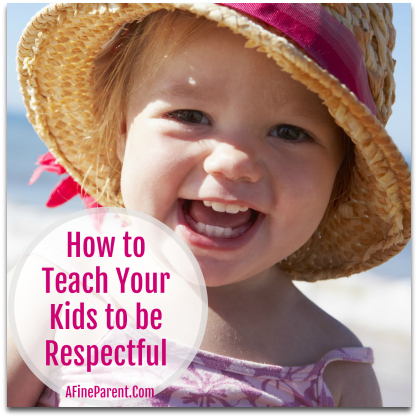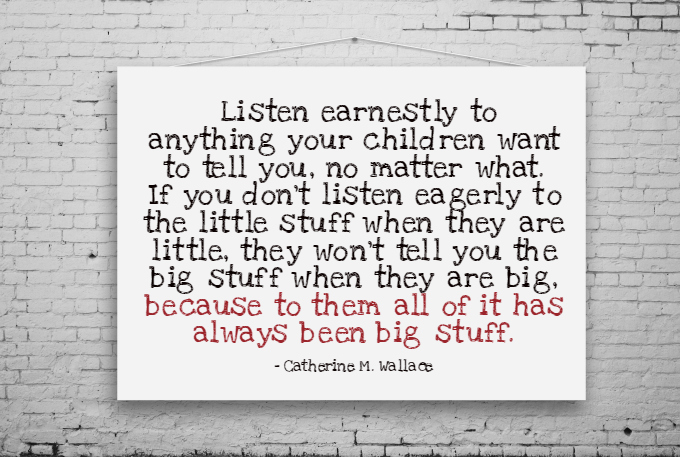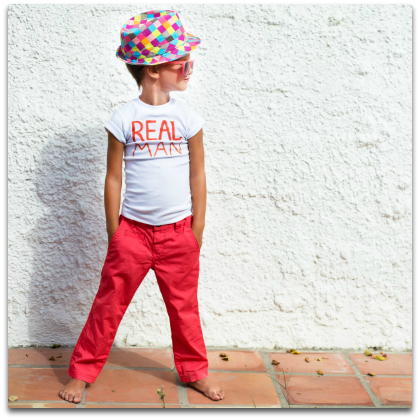 As a parent, you long to be respected by your kids. And you want to be proud of their respectful behaviour when you are out and about. Right?
As a parent, you long to be respected by your kids. And you want to be proud of their respectful behaviour when you are out and about. Right?
I know I do.
How do we raise respectful kids, though?
Respect isn’t like some of the other things we teach our kids.
It’s not something we can tell our kids how to do. The only way to teach this virtue is to show.
When we parent respectfully, our kids will grow with a solid foundation of knowing what respect looks like, how important it is, and subsequently how to respect others (including us!).
As parents, we are the authority figure in the relationship. Our role involves providing, nurturing, training, and protecting our kids. It is a mammoth responsibility. Respecting our children doesn’t in any way mean handing over our position to our kids and giving them the lead in our home. In fact, that would be an unloving thing to do!
So, what does parenting your child respectfully mean? What does it look like?
Let’s jump in and consider the following areas where we parents get the opportunity to model respect for our children. And together, we’ll develop the healthy habit of respecting our kids on a daily basis in simple and practical ways so they learn to be respectful towards us.
Respect Their Dignity
Avoid humiliating your child by talking about them (negatively) while they’re around.
I do it all the time. Especially as a stay-at-home mom, often the crazy and weird things my kids do is my news for the day – and I love talking about it with my husband! I enjoy relating sagas of how they painted their crib with the contents of their diaper or how they wet their pants in the middle of the store to their dad. Let’s face it, parenting is full of these stories to tell, right? (please tell me I’m not the only one!)
A friend recently related to me how her little girl burst into tears after a certain “silly incident.” When she asked her why she was crying, the little one covered her face with her little hands and said she was sad because she knew Mommy would tell other people about the “silly incident.”
And that’s when the light bulb went on for me.
 These are little people. They know when they’re being spoken about. What may seem like entertaining stories to us as parents (or a plea for sympathy from our spouses who missed the drama!) might cause them a great deal of embarrassment and discouragement.
These are little people. They know when they’re being spoken about. What may seem like entertaining stories to us as parents (or a plea for sympathy from our spouses who missed the drama!) might cause them a great deal of embarrassment and discouragement.
We need to take care to respect the dignity of our children, so let’s wait until their little ears aren’t listening before sharing the wacky and disastrous events of our day with others.
And even then, only with those close to us and whom we trust. Our kids’ stories, no matter how funny they seem to us at the moment, are not the fodder for social media gossip. This is particularly important to remember in a day and age where things can go viral in a heartbeat, and there is no way to take it back once it gets out there.
Don’t laugh at them when they’re distressed or upset.

It may seem incredibly funny when your toddler is having a meltdown over the sun going down, or your kindergartner feeling bad about her best friend playing with another child for all of five minutes, or your tween not wanting to leave her room because her new haircut makes her look so un-hip.
Kids freak out over some pretty odd stuff, right? Try NOT to laugh. Focus on those feelings, not the situation. Hold them, talk to them, and reassure them. Bite your lip if you have to, to keep from laughing. Preserving your child’s dignity is SO worth it.
While we all have a good giggle over the videos and photos we find sprinkled over social media of children hysterical over the color of their cereal bowl, taking videos and photos of our children in their distress, quite honestly, is not on. It’s unkind and disrespectful. Please don’t.
On a side note: When YOU do something silly or make a mistake, do try to laugh at yourself. As your child grows, it’ll be valuable to them to see that others make mistakes and it’s totally OK. Sometimes, laughing at yourself is a great way to accept your failings as a mortal human, move on, and try again.
Respect Their Voice
Listen (really listen) when they speak.
Is there anything more disrespectful than someone looking away from you and clearly focusing on something else when you’re talking to them? It makes you feel foolish, unimportant, frustrated, and often, upset.
And yet, we do this very often with kids and we don’t even think twice about it!
Yes, what they say may seem silly to us, but it is important stuff to them.
And pretending to listen as they prattle on, while checking email, Facebook, or even our to-do list on the side, is as disrespectful to them as it would be if they did it to us!
So, stop and listen. Focus on your non-verbal communication. Look into their eyes, nod your head, and ask relevant questions to make sure you understand. Sure, they might be telling you about the invisible monster who eats cars for breakfast and hates going to the shower – sigh. Listen anyway.
This quote really brought the point home to me:

So listen, avoid interrupting (unless it’s to clarify), and then respond.
There are times when kids won’t stop talking! And there are also times when they interrupt adult conversations. Ugh, it can drive you crazy, right? What then?
Come up with a signal or a plan between you and your child for these situations. Maybe have them come stand next to you when they have something to say, or hold your hand, and then you give them your attention as soon as you can. This will teach them respect and patience (not interrupting conversations, waiting their turn to talk) and will show your child respect (what they have to say matters to you and you want to hear it as soon as you can respectfully break away from the conversation you are currently in).
Respect Their Emotions
Avoid brushing off their feeling; acknowledge their emotions.
 Let’s face it: toddlers and small children are emotional roller coasters a lot of the time – one minute they’re laughing and happy, and the next minute they’ve collapsed in a heap on the floor, inconsolable.
Let’s face it: toddlers and small children are emotional roller coasters a lot of the time – one minute they’re laughing and happy, and the next minute they’ve collapsed in a heap on the floor, inconsolable.
The struggle is real.
They’re making sense of the world, and it just gets too much sometimes. It IS a big world, after all.
This is true of tween and teens as well, as they move from the cocoon of childhood into the demanding world of young adulthood.
Help them find the words that describe how they’re feeling (angry, jealous, frustrated, bored?). This will set the tone that leads to open communication and encourages honesty between you and your kids. And yes, you guessed it – it also cultivates respect.
By helping your kids process their feelings (as scary as it sounds, TRY to get in their heads, TRY to see things their way), you will be building up an empathetic environment, a safe place where your kids can develop, explore, and grow.
Respect Their Body
When they say “no” – STOP!
Maybe you love tickling your kids and listening to them giggle and squeal – it can be SO much fun (and toddler laughter is quite possibly, definitely, the most precious sound in the world, right?).
Maybe you love to give your growing munchkin a hug when you pick them up from school… it’s a great way to connect at the end of a busy day spent apart.
But if they ask you to stop, stop immediately! Even if you’re playing around, stop! Respect their body. It is theirs, not yours. By doing this, you will teach them that they have a say over their body. It will give them confidence to communicate when they feel uncomfortable about something. That is so valuable!
Just to clarify – ‘stop’ doesn’t mean stop immediately when you’re serving them their vegetables at dinner! They might try their luck, though (wink).
When it comes to physical affection, don’t force it.
 In our home, physical affection is completely optional!
In our home, physical affection is completely optional!
Rudeness, however, is not tolerated.
I teach my kids to greet people and show common courtesies (please and thank you, etc.), but they are never expected to hug and kiss other people (even me!) if they don’t want to, and I’m not alone in thinking this way. They need to learn from infancy onwards that unwanted physical affection is completely unacceptable! That their “no” means something.
Some of my family took a while to understand my point of view on this – I get it, they LOVE cuddles from my kids; so do I, but I respect my children, and I know that my family can enjoy them in so many ways that don’t involve hugging and kissing.
Not only does this communicate an attitude of respect to my kids, it makes them a lot less likely to be sexually abused over the course of their lives. It’s a sad but valid reality worth protecting our children from, as much as we can.
Bonus: This does mean that when they do cuddle, hug, or kiss you, it’s completely of their own will and means so much more – like getting a gift you didn’t ask for or hint at – it’s just the best feeling!
Just a quick note on this: physical affection is vital for a growing infant, as it is the perfect way to communicate love to your baby. It’s when your little one starts exerting their opinion or feelings about a certain thing that you need to stop and pay attention.
Respect their privacy.
Change their clothes in private. Close the bathroom door when you’re potty training them (stay with them, but teach them that they don’t have to be looked at by others). As they grow older, let them shower by themselves. And when they are adolescents, teach them very casually to do their own soiled laundry.
Respect their privacy as much as you can. This will teach them that their bodies are their own, and taking care of it is their special responsibility.
Respect Their Individuality
Your child is unique.
 Sure, maybe you wish they’d listen to you like their big brother always did or get good grades like their cousin always seems to. But avoid making these comparisons out loud.
Sure, maybe you wish they’d listen to you like their big brother always did or get good grades like their cousin always seems to. But avoid making these comparisons out loud.
I have yet to find a way not to think about it at all, but let it simply be a thought passing through – don’t voice it or dwell on it. The easiest way to raise insecure little people is to focus on their weak areas by comparing them to the other “better examples” around them – including siblings!
It’s not fair, and it’s disrespectful.
Instead, encourage your child to grow – and do it in a positive way. Saying things like, “Wow, my boy, you’re working really hard at listening better, thank you!” or, “I can see how hard you’re working on that assignment, is there some way I can help you?”
Avoid labeling your child.
Another way to parent respectfully is to avoid labeling your child – labels like “bully,” “cry-baby”, etc. only place limits on your child and attack their character instead of their behaviour.
Remember that all kids have their struggles, and all kids have their strong points! They’re all different, and they’re all special – as clichéd as that sounds, it really is the truth. Children that are brought up aware of their strengths, working at their weak areas, and striving to be the best they can be – regardless of others around them – will be self-motivated, aware, and tackle challenges with a positive attitude rather than a defeatist one.
Pretty amazing, right?
Totally worth it, too.
So, model respect, moms and dads. Live it out in your home. Respect your child’s body, their mind, their ideas, and their emotions. Then, as they grow, marvel at the fruit of this hard (but worthwhile) investment as you witness your child becoming an individual who respects themselves, others, and you! What a precious gift to give your child.
 The 2-Minute Action Plan for Fine Parents
The 2-Minute Action Plan for Fine Parents
For our quick contemplation exercise today:
- Reflect on your parenting over a typical day and jot down a couple of regular issues you have with your child that might be related to a lack of respect (on your part or theirs).
- Decide on one or two things that you want to change and talk to your partner about it (so you can work at it together and hold each other accountable).
- Do you listen to your child completely? Figure out how you can start doing this more often. (If you do this already, great! I know most parents, including myself, need a reminder every now and then.)
The Ongoing Action Plan for Fine Parents
Consider your child holistically—physically and emotionally—and strive to show them respect. If there is a particular area you need to work on (or completely change), start putting those changes into action, knowing it will take time for the new habit to form and become “normal” for both you and your child.
Expect to see sides of your child you may not have seen before, or they might not have shared with you—especially on the emotional front. A child who feels respected and valued will communicate more effectively and might surprise you.
You will make mistakes—the good news is that most children will respect their parents more when they humbly and genuinely ask forgiveness and clearly make a change (that’s the key—not repeating the same mistake over and over again, which waters down trust). When you’re not sure what to do, put yourself in their shoes and consider how you would want to be treated, spoken to, helped, etc. Empathise.
Good luck!
This article (along with all the others in the series) seriously was what I was looking for. I have a beautiful strong willed 6 yr old daughter and I needed the reminder that WE as parents are the examples for our children. If we want them to do different than WE have to. I’m also glad to read I’m not the only parent having trouble parenting in this day and age! (Because let’s face it we always think it’s only OUR kids acting “badly”) I have started to implement your tips but this article really hit home and the change has to come from ME. Thank you sooooo much for articles.
Amazing article. Best was how we talk about them in family n I do that never realized how it affects them also but we talk about good things or act of kindness and how smart and brave they were does that affect them too.
I actually wanted to come back and say that this was a very good article. My cousins constantly talk about their kids in a negative way in front of them. My aunt and I have been speaking up when it happens and we will use your article to try to help us implement that change.
It’s a good article, but it will be better if you make the verbs match the nouns. I understand you are trying to avoid using “he” or “she”, but one way to easily make this better is simply to say “children” whenever you’ve said child. Your children.
This article reminds me about the time when my husband was worried about labelling our younger son. Testing had shown that he suffered from dyslexia, and that he should be given access to some special classes. We eventually arranged for his attendance in the special classes. He has a good job, one where he is respected for what he can do well.
Providing exactly what your son needed while maintaining his dignity and self worth – wow! I can hear how proud you are of him, that’s wonderful!
This article couldn’t have come at a more needed time. My little one is 4 years old. Enough said 😉 Thank you so very much for these tips! Sharing with the hubby right now.
Elisa, I’m so glad to hear that! Four is such a fun age, enjoy!
I did this with my three oldest!! And I’m always told that I have such amazing, respectful boys. By the time my youngest three came along, I was exhausted. And stressed out. Parenting is a lot of work! I have three naughty little boys. But reading through this, I’m reminded that I have neglected my parental duties. Of course they are naughty – I show them very little respect!! It’s time to nip it in the butt – my butt, not theirs!! Thank you for the much needed reminder Nicole!!
Shannon, it really is hard work! I’m sure those little boys keep you on your toes! Keep at it, enjoy them and know that you can do this. Be inspired, tired mama!